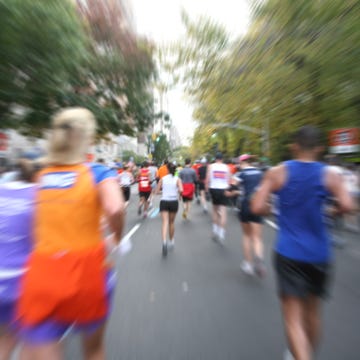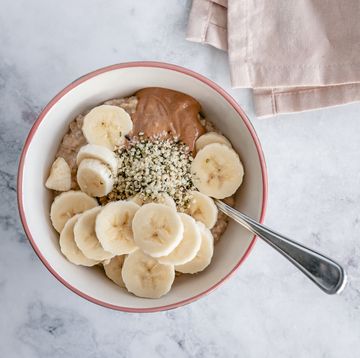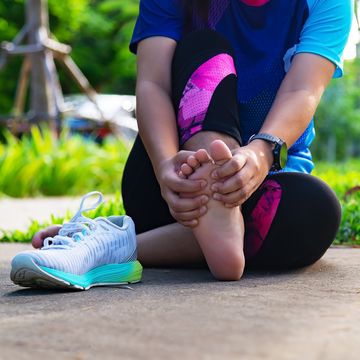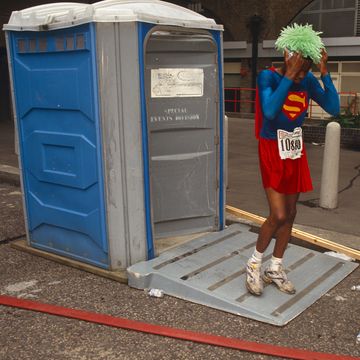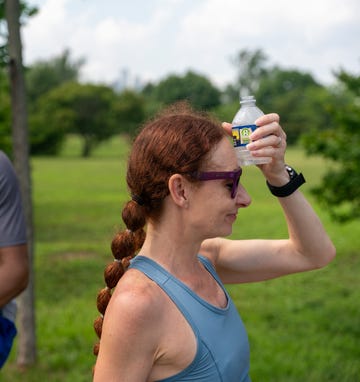Not everyone is a morning person. However, if you often struggle to wake up in time or start your days feeling unrefreshed, it could pose a problem – especially if want to run at your best and have a race in the diary.
Exercise like running can help to improve your sleep quality and quantity, and, if anything, being a runner means you need to make sleep a priority. Even so, good sleep isn’t always a given, particularly if you have to cram all of your training, work, family commitments, social life, sleep demands and more into just 24 hours.
If you find yourself hitting the snooze button more than you should every morning, this may be a sign that you need to shift your lifestyle habits – or, perhaps, it may signal something more serious. Here’s what can cause this sleepiness, and what you can do about it.
What everyone's reading
Reasons why it’s hard to wake up in the morning
Sleep loss
‘Whenever someone wakes up in the morning and they’re not refreshed from their sleep, it could be a duration issue and it could also be a quality issue,’ says Matthew Silvis, Director of Sports Medicine at Penn State Health. While you should focus on how much sleep you’re getting each night – and at least try to meet the National Sleep Foundation’s (NSF) recommendation of seven to nine hours per night for adults – you should also consider the quality when it comes to your personal sleep needs.
The NSF website states that the seven- to nine-hour rule is just a general recommendation and you may need more sleep depending on your age and lifestyle. For example, if you’re a runner who is training for a long distance race like a marathon, you may need more shut-eye.
‘Any sort of strenuous physical activity essentially forces our body to want to repair itself,’ notes Joseph Schellenberg, a pulmonologist at the Lehigh Valley Health Network. ‘We’re either trying to grow muscle or grow stamina, and that happens during sleep – particularly during slow wave sleep, which is our deepest sleep.’ This stage of sleep occurs multiple times during a good night’s kip. However, if you sleep for six hours or less, Schellenberg says that you’re at risk of not getting enough of this restorative type of sleep. As such, your body might not be able to fully recover from your training.
This disrupts more than just your ability to wake up on time. Whether you’re acutely sleep deprived – meaning you missed out on just one night of quality sleep, for example – or chronically sleep deprived – meaning you consistently don’t get enough – Schellenberg says that it can affect your ability to function for the entire next day.
Overtraining
When a runner engages in excessive or intense training without proper rest and recovery, it could lead to overtraining. And, according to Philip Skiba, Director of the Jefferson Sports Medicine Fellowship at Thomas Jefferson University, sleep is one of the first things that gets disrupted among runners with overtraining syndrome.
A higher training load requires more of a time commitment, which can lead to trouble if you persistently don’t get the proper rest you need. So, you may need to shift your schedule to make time for more sleep as your training increases, which means winding down and getting to bed earlier.
Sleep disruptions
Sleep disruptions can show up in a variety of ways throughout your training.
For example, if you’re overtraining and not recovering after workouts, you put yourself at greater risk of running related injuries like stress fractures or plantar fasciitis. In the event of an injury, Schellenberg says that the aches and pains associated with it may disrupt your night, meaning you’re less likely to get the quality sleep you need.
Frequent trips to the toilet in the middle of the night can disrupt your restorative sleep, too, which is why Silvis recommends that you avoid drinking too much fluid before bed.
Caffeine intake
Consuming caffeine (including coffee and caffeinated gels) after midday can make it harder for you to wake up the next morning – and both Skiba and research confirm this.
A small double-blinded study published in Nutrients found that consuming caffeine in the evening can especially impair sleep quality in runners. During the study, 15 trained male runners consumed either a placebo or a caffeine supplement at 7pm, approximately one hour before completing an 800m trial test. Researchers then analysed the effects of caffeine on the runners’ performance, sleep quality and hearts during sleep. A questionnaire also assessed the quality and calmness of the runners’ sleep, as well as how refreshed they felt waking up. This process was repeated the next day.
Overall, the study determined that consuming the caffeine supplement didn’t improve running performance but did impair sleep efficiency and wake time, and increase the number of awakenings during the night. This gives more reason to cut back on the caffeine closer to bedtime.
Changes to your circadian rhythm
This is particularly the case if you’re travelling across time zones – most notably, if you’re going east. Silvas says that it’s more problematic travelling east than west, because if you travel eastward, your exposure to daylight is shortened. This can make it harder for some runners to fall asleep at night and wake up in the morning.
Skiba adds that your work schedule may also be to blame, especially if you have a varying schedule or if you exercise before bed. In general, exercise raises your body temperature, so if you run a few hours before bedtime you may find it harder to fall asleep at night. This can result in an unsavoury combination of sleep deprivation and morning grogginess.
Medication
According to Skiba, certain sedating medications that can cause general drowsiness – like allergy medications or beta blockers – can make it harder for you to wake up in the morning. As such, he recommends speaking with your GP to identify and change any medications that may cause you to feel drowsy.
Sleep disorders
If you have a solid bedtime routine and your sleep isn’t being disrupted by something out of your control, like noise or going to the toilet, then the source of your morning fog could be a sleep condition. In this instance, Schellenberg says you’d be wise to speak with and be tested by your GP.
Here are the most common sleep conditions:
Sleep apnea
- This common condition occurs when your airway is blocked repeatedly during sleep, causing your breathing to stop for short amounts of time.
Restless legs syndrome
- This condition causes a strong urge to move the legs, typically at night when you’re sitting or lying down.
Narcolepsy
- This less-common neurological disorder affects the brain’s ability to control the sleep-wake cycle. However, according to the National Institute of Neurological Disorders and Stroke, people with narcolepsy tend to wake up feeling refreshed and instead experience fatigue throughout the day. Schellenberg says that this is likely because their brains don’t produce enough of a neurochemical that promotes wakefulness.
Idiopathic hypersomnia
- This rare condition cause someone to feel very sleepy, even after they’ve had a full night’s rest.
How to wake yourself up in the morning
Here are a few tips to help you start your day well, particularly if you have trouble waking up in the morning.
1. Get enough sleep
As mentioned earlier, the NSF recommends that adults seven to nine hours of sleep each night. However, as your training load increases, you may need to get a bit more kip in order to recover fully.
This is why ‘you should give yourself the capacity to sleep longer,’ says Silvis. While this doesn’t necessarily mean that you have to sleep for 10 hours on end, your sleep should increase in line with your training volume.
To better understand your sleep needs, Silvis recommends periodically checking your fatigue levels on a scale of one to 10 throughout the day. If you find that your energy level is consistently at the low end of the scale (in other words, closer to one), then this could indicate that you need to get more rest.
2. Adjust your sleep schedule
If you have plans to travel to a different time zone for an overseas race, you’ll want to adjust your sleep schedule to that time zone either before or shortly after you arrive. That way, you can avoid having a hard time waking up on race day.
Many experts, including Silvis, recommend arriving at your race location a day early for each time zone that you cross. For example, if you’re travelling from California to New York and crossing three time zones in the process, you should give yourself at least three days to adjust.
If you don’t have the opportunity to arrive early, then Silvis recommends implementing a sleep strategy that will account for the time change at least a week before your race. He suggests pretending that you’re already at your race destination and going to bed based on that time zone, rather than your local time.
3. Stop hitting snooze
Unfortunately, snoozing your alarm won’t let you reap the rewards of bonus sleep. ‘If you’re waking up every nine minutes, chances are you’re not going back into any deeper restorative or REM sleep,’ says Schellenberg. At that point, he says, you’re just moving into light sleep, which doesn’t have a significant benefit when you’re waking up in the morning. So, Schellenberg recommends that you set your alarm to the time that you actually want to wake up, so you avoid drifting in and out of light sleep.
4. Create a good sleep environment
To create a good sleep environment, make sure that your bedroom temperature is between 18°C and 21°C, as research shows that your bedroom temperature can influence your body temperature and sleep quality. More specifically, a study published in the journal SLEEP, which analysed 3.75 million nights worth of sleep data, found that there was a 0.06% decrease in sleep efficiency for each degree increase in bedroom temperature between 60°F (16°C) and 85°F (29°C).
Silvis, too, recommends that you set your bedroom temperature to 18°C. He also says that you should avoid wearing too many clothes in bed or have too much bedding on top of you, as this can increase your body temperature and, as a result, disrupt your sleep.
Lastly, to improve your sleep quality and help you wake up feeling refreshed, Skiba suggests sleeping in a dark room and reducing your screen time before hitting the sheets.
5. Get active
Once you’re awake, it’s important to get out of bed and start your daily routine immediately. Schellenberg suggest heading to the brightest part of your house first, because this helps your brain to understand that the day is starting. You can do this by opening the blinds to let in direct sunlight – which Schellenberg says is the most effective method – or by going for a morning stroll. In fact, research shows that going for a morning walk can improve cognitive performance, like your decision making ability, throughout the day.

Monique LeBrun is a health and fitness editor who is based in Easton, Pennsylvania. She covers a wide range of health and wellness topics, with a primary focus on running performance and nutrition. Monique is passionate about creating content that empowers runners to become the best versions of themselves. As an avid runner and parent, she loves spending time outdoors with her daughter, who often accompanies her on weekend runs as her personal mini run coach.
Rachel is Runner's World UK's Senior Content Writer, covering all running-related topics from training advice and gear reviews to race reports and elite runner profiles. Formerly a Website Content Editor and Content Manager at London Marathon Events and The Running Channel respectively, Rachel is well-versed in the running scene and understands what it takes to put on some of the biggest running events in the world. A 2:50 marathoner, she would much rather run 26.2 miles than race a 5K and has currently completed 11 marathons, including five of the six Abbott World Marathon Majors in a sub-3 time. She now hopes to run the Tokyo Marathon to complete the set and become a Six Star Finisher.



